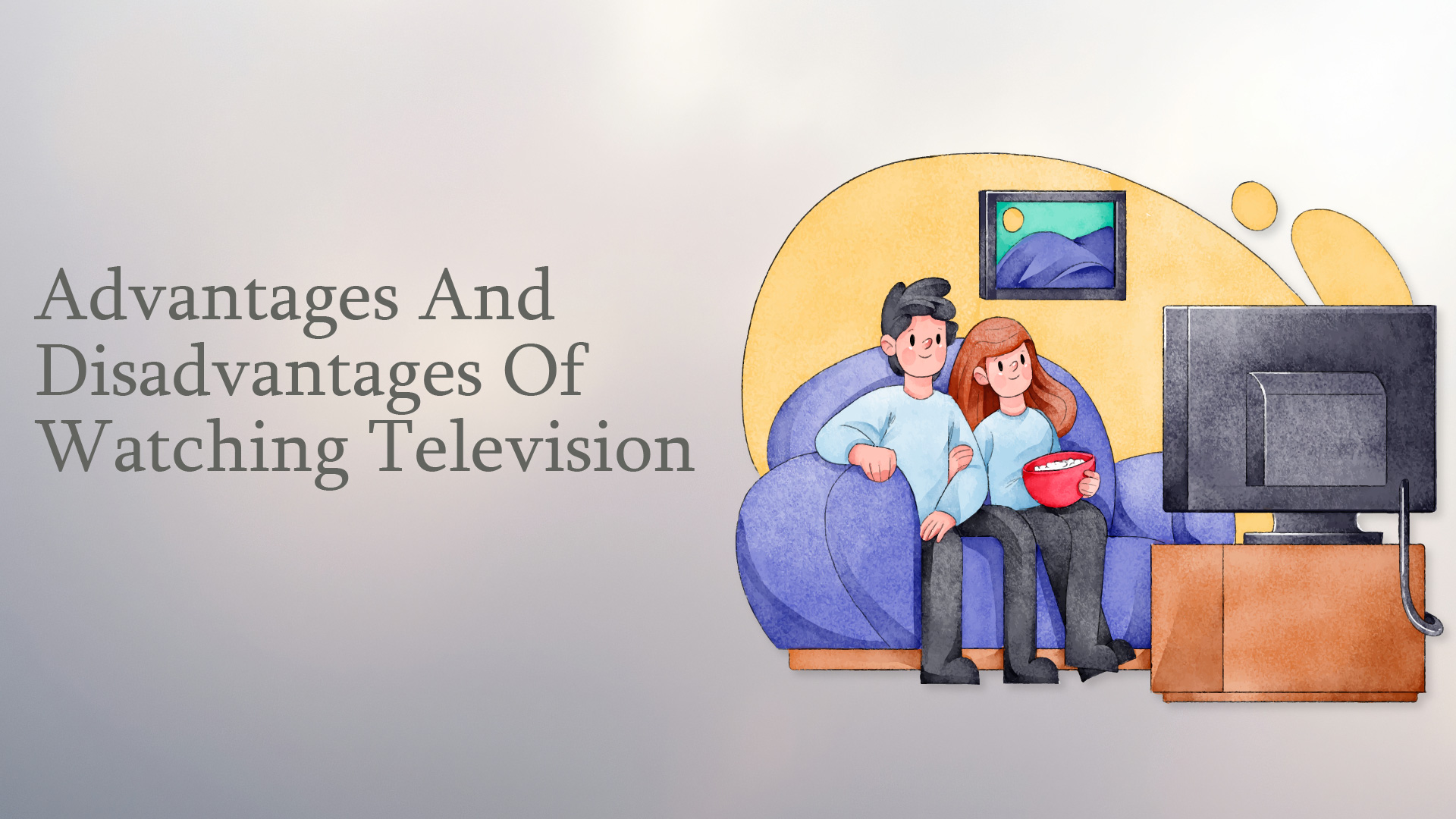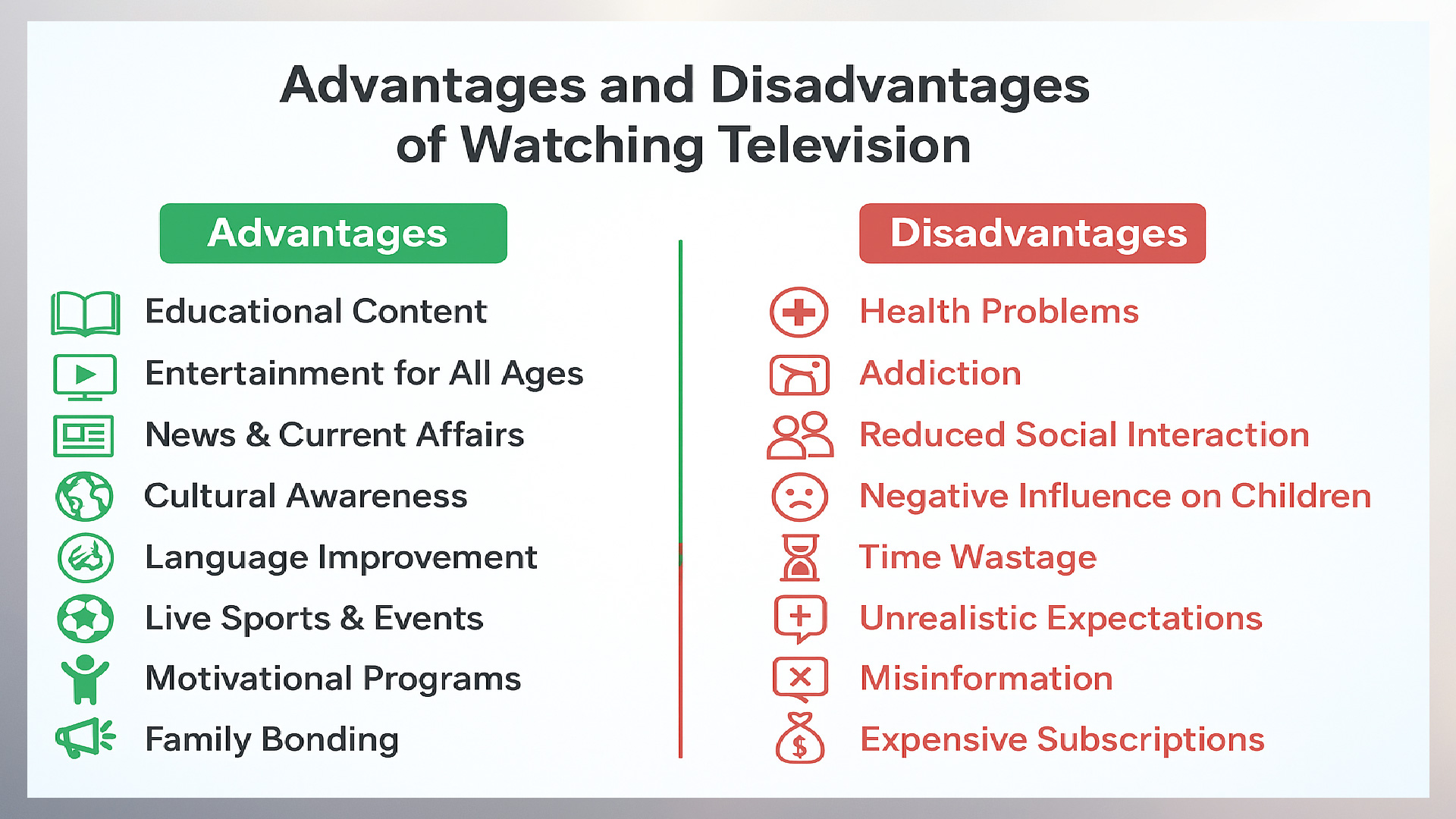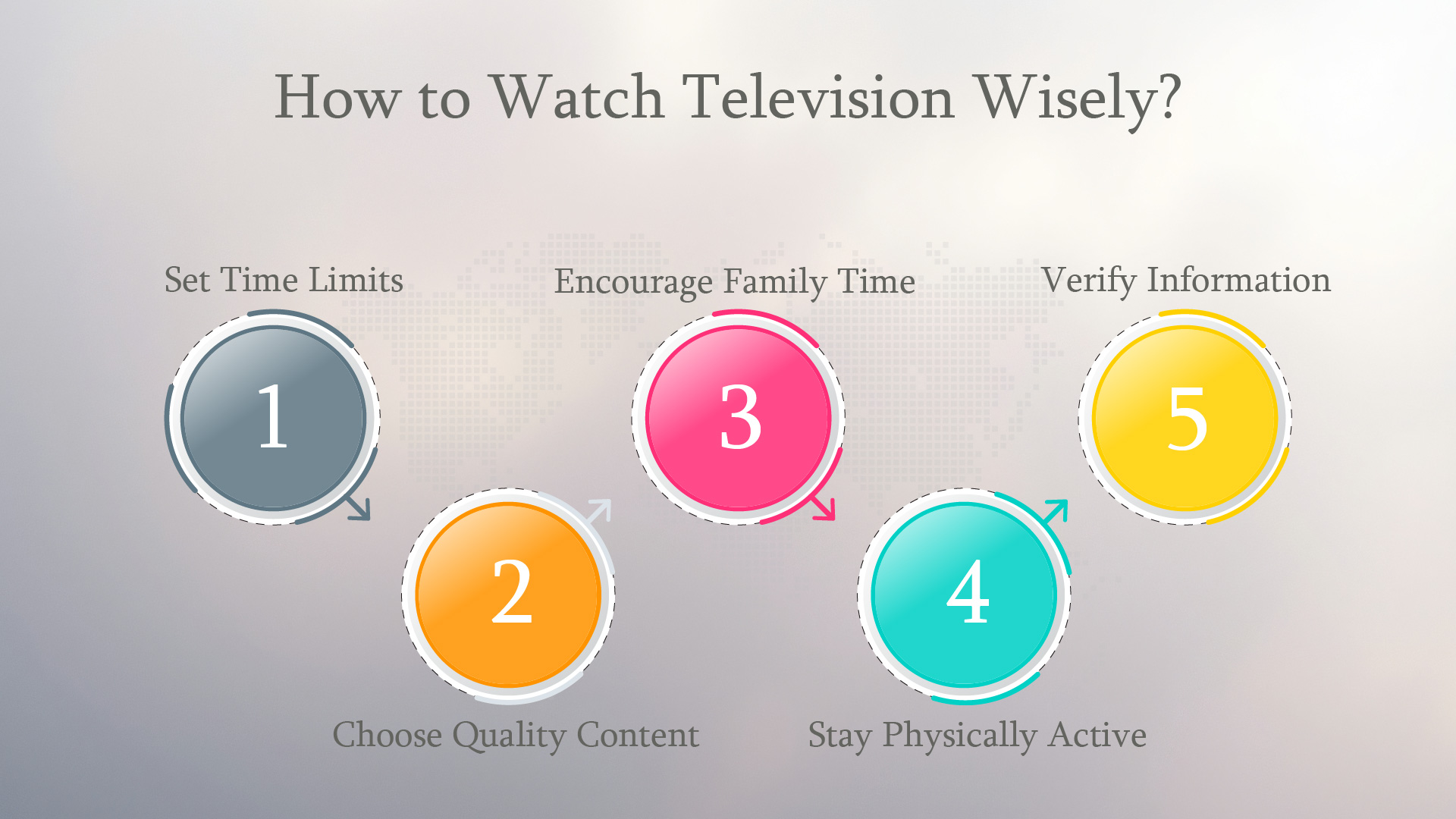
Television has been an important part of our lives for decades. Almost every home has a TV set, and even though streaming services and smartphones are popular today, television still plays a huge role in how we learn, relax, and entertain ourselves. But like anything else, TV has both benefits and drawbacks. In this blog, we’ll dive deep into the Advantages and Disadvantages of Watching Television so you can see the bigger picture.
Why Talk About Television?
Whether you enjoy daily soaps, movies, news, or documentaries, television impacts us in more ways than we realize. It can be educational, entertaining, and informative, but it can also lead to health and social issues if not used wisely.
This article will explore the advantages of TV and the disadvantages of television, with real examples and simple explanations. We’ll also answer the common question many people search for online: What are the 10 advantages of television? And what are the 10 disadvantages of television?
So, let’s switch on the remote and get started!

What are the 10 Advantages of Television?
Television is more than just a “box of moving pictures.” It has several positive sides when used in the right way. Here are 10 advantages of television:
Educational Content
TV channels like National Geographic, Discovery, and History provide knowledge about science, culture, history, and wildlife. Children and adults can learn while being entertained.
Entertainment for All Ages
One of the biggest advantages of TV is its variety. From cartoons for kids to dramas and movies for adults, everyone finds something to enjoy.
News and Current Affairs
Television keeps us updated with national and international news instantly. It connects us with the world in real-time.
Cultural Awareness
Watching shows and documentaries helps us learn about different cultures, traditions, and lifestyles without leaving our homes.
Language Improvement
TV programs in different languages can help viewers improve vocabulary, pronunciation, and communication skills.
Live Sports and Events
Fans can watch live matches, concerts, and award shows without needing to travel. This is one of the advantages of television that makes it very popular worldwide.
Motivational Programs
Channels often air motivational speeches, success stories, and health tips that inspire people to improve their lives.
Family Bonding
Watching TV shows together is a great way for families to bond and spend quality time.
Awareness Campaigns
Governments and NGOs use TV ads to raise awareness about social issues like health, education, and the environment.
Convenient Entertainment
Unlike going to a cinema or event, TV provides entertainment at home anytime, saving both time and money.
In short, the advantages of television go beyond fun – it educates, informs, and connects us to the world.
What are the 10 Disadvantages of Television?
Now let’s look at the flip side. Watching too much TV or the wrong kind of programs can have negative effects. Here are 10 disadvantages of television:
Health Problems
Long hours of watching TV can cause obesity, eye strain, and back problems due to lack of physical activity.
Addiction
One of the biggest disadvantages of television is that people can get addicted, wasting hours instead of doing productive work.
Reduced Social Interaction
Excessive TV viewing reduces face-to-face conversations with family and friends.
Negative Influence on Children
Kids often imitate violent or inappropriate behavior shown on TV, which can affect their development.
Time Wastage
Instead of studying, exercising, or working, many people spend hours binge-watching shows.
Unrealistic Expectations
Dramas and advertisements sometimes create false ideas of beauty, wealth, or success, leading to dissatisfaction in real life.
Exposure to Misinformation
Some channels spread biased or fake news, confusing viewers instead of informing them.
Expensive Subscriptions
Cable and DTH services can be costly, especially when combined with paid channels and streaming services.
Sleep Problems
Watching late-night shows or movies often leads to disturbed sleep patterns.
Less Creativity
Spending too much time in front of the screen reduces creativity and outdoor hobbies like reading, painting, or playing sports.
So, while TV offers entertainment and learning, its disadvantages can’t be ignored if used without balance.
Balanced View: Advantages of TV vs Disadvantages of TV
Here’s a quick comparison of the advantages of television and its drawbacks:
| Advantages of Television | Disadvantages of Television |
| Educational content & documentaries | Health problems like obesity |
| Global news & current affairs | Addiction & time wastage |
| Family entertainment | Reduced social interaction |
| Live sports & cultural shows | Negative influence on kids |
| Motivation & awareness programs | Unrealistic expectations |
This table shows that TV can be either a blessing or a problem, depending on how we use it.
How to Watch Television Wisely

Since television is here to stay, the solution is not to avoid it completely but to use it smartly. Here are a few tips:
- Set Time Limits: Avoid spending more than 2–3 hours daily in front of the TV.
- Choose Quality Content: Watch educational, motivational, and informative programs.
- Encourage Family Time: Watch shows together instead of isolating yourself.
- Stay Physically Active: Take breaks, stretch, or exercise to avoid health issues.
- Verify Information: Double-check news or facts instead of blindly believing everything on TV.
Final Thoughts
Like many things in life, TV has two sides. The advantages of TV include education, entertainment, and awareness, while the disadvantages of television revolve around health risks, addiction, and misinformation.
The key takeaway is simple: moderation is the secret. If you manage your time well and choose the right content, television can be a wonderful tool for learning and relaxation. But if you overuse it, the negative effects will outweigh the positives.
So, next time you pick up the remote, remember both the Advantages and Disadvantages of Watching Television—and make a smarter choice!
FAQs
Q: Is watching TV good for students?
A: Yes, if students watch educational programs, documentaries, and news channels in moderation, TV can enhance their learning. But too much entertainment-focused content may distract them from studies.
Q: How many hours of TV per day is healthy?
A: Experts suggest limiting TV time to 1–2 hours per day, especially for children. Adults should also balance TV with physical activities and hobbies.
Q: Can watching TV improve language skills?
A: Definitely, watching shows in different languages can help improve vocabulary, pronunciation, and listening skills. Educational shows are particularly useful for this.
Q: Does TV affect mental health?
A: Yes, both positively and negatively. Motivational programs and relaxing shows can boost mood, but violent or negative content can lead to stress, anxiety, or fear.
Q: Which is better: TV or mobile streaming?
A: Both have pros and cons. TV offers a larger screen and shared family experience, while mobile streaming is more personal and portable. The choice depends on preference and lifestyle.
Q: Is it okay for kids to watch cartoons daily?
A: Cartoons are fine if they are age-appropriate, educational, and limited in duration. However, violent or overly addictive cartoons should be avoided.
Q: Does watching TV make you lazy?
A: If overdone, yes. Too much TV reduces physical activity, leading to laziness, weight gain, and less productivity. Watching in moderation avoids this issue.


